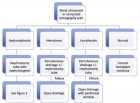About Ministry of Health
Ministry of Health
Articles by Ministry of Health
Dietary and Lifestyles assessment among Obese Women in Gaza City, Palestine
Published on: 4th December, 2018
OCLC Number/Unique Identifier: 7943259697
Background: The fundamental cause of obesity and overweight is an energy imbalance between calories consumed and calories expended.
Aim: To clarify and figure out food habits and different lifestyle pattern among a sample of Palestinian women attending the nutrition center in the Gaza Strip.
Methods: A cross-sectional study involved 116 women were randomly chosen by purposive census sampling. They aged 25 to 60 years with a diagnosis of obesity. The data collected by interview questionnaire that included social factors, lifestyle habits, and health/disease history.
Results: Age group variable has distributed significantly (p=0.024), (31.0%) of morbid obese were ≥35 years group compared to (13.5%) of morbid obese amongst the younger group. The higher intakes of legumes (OR: 2.134, P=0.003), nuts (OR: 3.917, P=0.019), eggs (OR: 6.840, P=0.009), fast foods (OR: 4.461, P=0.005), and soda drinks (OR: 2.230, P=0.004) were the risk factors linked to the increased risk of morbid obesity. Moreover, the higher intakes of legumes (OR: 8.439, P=0.011), eggs (OR: 6.900, P=0.041), chips (OR: 5.049, P=0.012), sugar (OR: 2.068, P=0.011), and fast foods (OR: 3.029, P=0.025) are risk factors of chronic diseases.
Conclusion: The study identified several lifestyle factors and improper dietary habits associated with obesity among women in Gaza city. There is a great need to change these habits to avoid the increased risk of obesity. Gene-environment interaction can explain the high incidence of obesity. A national plan of action to overcome obesity is urgently needed to reduce its economic and health burden
Some Aspects of medicine distribution in Sudan
Published on: 3rd September, 2018
OCLC Number/Unique Identifier: 7856179481
The strategy of price liberalisation and privatisation had been implemented in Sudan over the last decade, and has had a positive result on government deficit. The investment law approved recently has good statements and rules on the above strategy in particular to pharmacy regulations. Under the pressure of the new privatisation policy, the government introduced radical changes in the pharmacy regulations. To improve the effectiveness of the public pharmacy, resources should be switched towards areas of need, reducing inequalities and promoting better health conditions. Medicines are financed either through cost sharing or full private. The role of the private services is significant. A review of reform of financing medicines in Sudan is given in this study. Also, it highlights the current drug supply system in the public sector, which is currently responsibility of the Central Medical Supplies Public Corporation (CMS). In Sudan, the researchers did not identify any rigorous evaluations or quantitative studies about the impact of drug regulations on the quality of medicines and how to protect public health against counterfeit or low quality medicines, although it is practically possible. However, the regulations must be continually evaluated to ensure the public health is protected against by marketing high quality medicines rather than commercial interests, and the drug companies are held accountable for their conduct.
Association Between Internet Gaming Disorder And Attention Deficit Hyperactivity Disorder: A Narrative Review
Published on: 1st December, 2022
Background: The rapid increase in the popularity of internet use and video games is associated with multiple consequences and comorbidities; therefore, investigating this issue is important, especially now that the number of people playing video games has reached approximately 2.2 billion people worldwide.Method: This paper reviews the existing literature on Google Scholar and PubMed to examine the association between internet gaming disorder (IGD) and attention deficit hyperactivity disorder (ADHD) between 2013 and 2020.Result: The reviewed studies reveal a statistically significant association between ADHD and IGD. The reviewed studies demonstrate that ADHD is a predictive factor for the development and persistence of IGD and affects the severity of IGD symptoms.Conclusion: Especially among those with ADHD, IGD causes life distress and social life impairment. This review indicates a statistically significant association between ADHD and IGD; however, longitudinal studies are needed to assist the direction of this association and make relevant and appropriate recommendations to prevent its consequences and comorbidities.

HSPI: We're glad you're here. Please click "create a new Query" if you are a new visitor to our website and need further information from us.
If you are already a member of our network and need to keep track of any developments regarding a question you have already submitted, click "take me to my Query."















































































































































